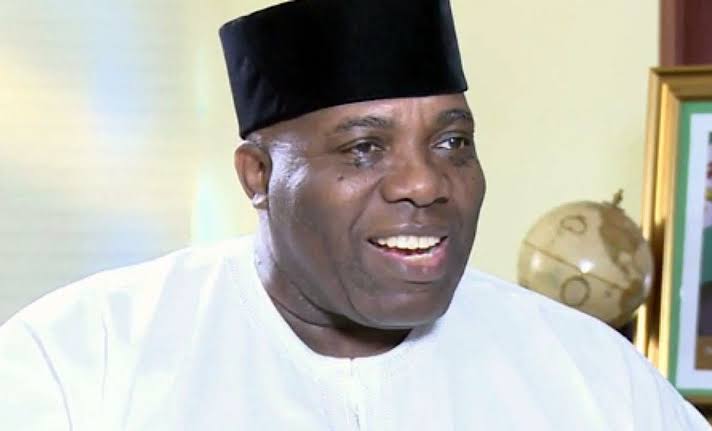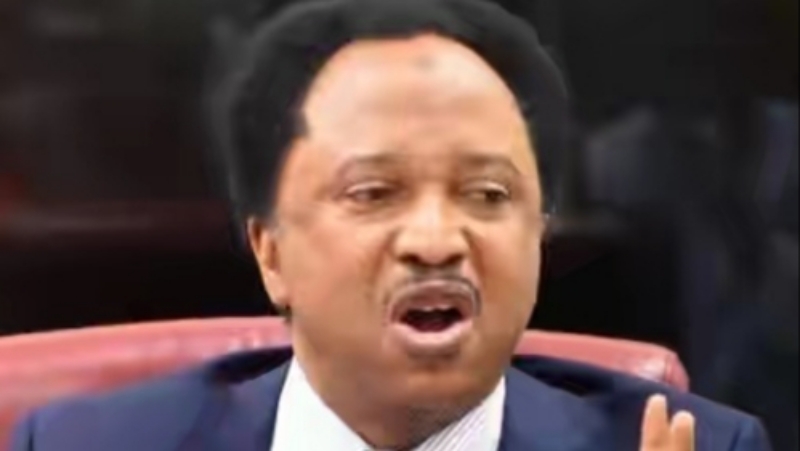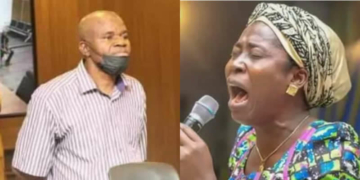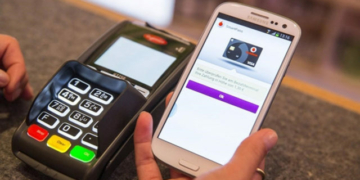- Nigeria signs Samoa agreement, sparking controversy over alleged LGBT clause
- Doyin Okupe, Sani Shenu, others advise FG to quit the agreement
- FG clarifies issues, says the agreement has nothing to do with LGBT
On November 15, 2023, Nigeria with other countries signed Samoa agreement. Until recently, the Samoa agreement was viewed especially Nigerians to be a multilateral trade agreement between Nigeria and member states.
The worth of the trade is said to have been in the tune of $150b, which gives member state some sort of relief in multilateral trade both in physical and advisory.
However, on June 28, Sonnie Ekwowusi, a Lagos-based lawyer and chairman of the Human and Constitutional Rights Committee of the African Bar Association (AfBA), raised concerns in an article on Wednesday, published by one of the Nigeria media houses.
He went further to criticize the signing of the Samoa Agreement, describing it as “nauseating” and questioned the judgment of Nigerian officials.

“Certain Articles of the Agreement especially Articles 2.5 and 29.5 legalise LGBT, transgenderism, abortion, teen sexual abuse, and perversity in African countries. The signing of the Agreement by Nigeria constitutes a threat to the sovereignty of Nigeria and Africa. It further debases our democracy.
“I can wager that neither Minister Atiku Bagudu nor the Nigerian officials or diplomats who signed the Samoa Agreement on our behalf, understand the import of the agreement to Nigeria’s sovereignty, let alone the destructive impact of the Agreement in Nigeria. This explains why many African bodies including the AfBA have condemned the agreement and respectfully urged African countries not to sign it.
“Not infrequently, Nigerian officials in Geneva, New York, and other places sign international agreements or treaties over a cup of coffee or a glass of wine with little or no knowledge of their contents,” Ekwowusi said.
Ekwowusi further queried whether Nigerian officials who signed the agreement were representing the interests of the Nigerian people.
He recalled that Nigeria and 34 other African, Caribbean, and Pacific countries had initially refused to sign the agreement on November 15, 2023.
In any case, by July 1, there was anxiety and concern over the signing of the agreement especially as many countries were said to have backed out from the agreement.
These countries include; Benin, Senegal, Liberia, Botswana, Burundi, Jamaica, Mali, Rwanda, Tanzania, Uganda, Somalia, Namibia, Grenada, Eritrea, Malawi, Guinea-Bissau, Madagascar, Antigua and Barbuda, the Bahamas, the Central African Republic, Cuba, the Dominican Republic, Equatorial Guinea, Eswatini, Guyana, the Maldives, Mauritania, Nauru, Palau, Saint Lucia, Saint Kitts and Nevis, Tonga, Trinidad and Tobago, and Tuvalu.
There is no gainsaying the fact that the reports attracted a backlash against the federal government as critics criticised the government for downgrading the country’s moral values in exchange for Western loans.
How the lawyer got it wrong
By and large, contrary to Ekwowusi’s claims amplified by the newspapers, there is no mention of LGBT in the Samoa agreement article.
Findings by WITHIN NIGERIA showed that there is no mention of LGBT in article 2.5 as claimed by the lawyer.
The controversial article reads thus; “The Parties shall systematically promote a gender perspective and ensure that gender equality is mainstreamed across all policies”
More so, Article 29.5 also did not mention LGBT as claimed by the lawyer.
The said Article reads thus; ”The Parties shall support universal access to sexual and reproductive health commodities and healthcare services, including for family planning, information and education, and the integration of reproductive health into national strategies and programmes.”
According to the reviewed document and EU press statements, the now controversial agreement focused on addressing global challenges.
Its objectives aim to contribute to achieving the United Nations (UN) Sustainable Development Goals (SDGs) and the Paris Agreement adopted under the UN Framework Convention on Climate Change.
In one of its press statements, the EU highlighted the priority areas of the agreement to include human rights, democracy and governance, peace and security; human and social development, inclusive, sustainable economic growth and development, environmental sustainability and climate change; and migration and mobility.
Our reporter gathered that there was a series of negotiations before the agreement was finalised – the Nigerian government’s press statement issued last year and another EU press statement confirmed this.
Emphasising that the parties will commit to promote, protect and fulfil all human rights, be they civil, political, economic, social or cultural, the EU, in the press statement, noted that “some ACP states were reluctant to see the foundation agreement mention sexual orientation and gender identity (LGBTI rights) – an issue on which there are also differences among EU Member States.”

In the statement, the EU referred to the provision of Article 36.2 of the agreement when it says: “As a matter of compromise, the parties will commit to the implementation of existing international agreements – notably the International Conference on Population and Development Programme of Action on sexual and reproductive health and rights, the Beijing Platform on gender equality and their follow-up.”
However, it grumbles that the above wordings “falls short of the EU negotiators’ ambitions.”
Nevertheless, there was an allegation that LGBT clauses were contained in the initial draft of the Samoa Agreement, but protests by some member states forced the EU to abolish the clauses in the final document.
This was evident when the EU, in another document, said it welcomes the commitment to promote universal human rights without discrimination based on any ground “but regrets that the Agreement fails to mention explicitly that discrimination could be based on sexual orientation and gender identity.”
The EU went ahead to plead with parties to “avoid any discrimination based on sexual orientation and to put an end to the criminalisation and punishment, including the death penalty, of LGBTI people.”
Why the Samoa Agreement generated reactions
In Nigeria, homosexual act is criminal offence punishable by 10 years in prison.
In January 2014, the then Nigerian President Goodluck Jonathan signed a bill on that criminalises same-sex relationships.
Defying pressure from Western governments to respect gay and lesbian rights, Dr. Jonathan signed the bill, making the country a no go area for the LGBT.
The bill, which contains penalties of up to 14 years in prison and bans gay marriage, same-sex “amorous relationships” and membership of gay rights groups, was passed by the national assembly in May 2013, but Jonathan had delayed signing it into law.
Under existing Nigerian federal law, sodomy is punishable by jail, but this bill legislates for a much broader crackdown on homosexuals and lesbians, who already live a largely underground existence.
While European countries, most recently France, have moved to offer same-sex couples the same legal rights enjoyed by heterosexuals, many African countries are seeking to tighten laws against homosexuality.
Britain and some other Western countries have threatened to cut aid, a threat that has helped hold back or scupper such legislation in aid-dependent nations like Uganda and Malawi.
But they have little leverage over Nigeria, whose budget is funded by its 2-million-barrel-per-day oil output.
According to the bill,”Persons who enter into a same-sex marriage contract or civil union commit an offence and are each liable on conviction to a term of 14 years in prison.”
The bill also read that “Any person who registers, operates or participates in gay clubs, societies and organisations or directly or indirectly makes public show of same-sex amorous relationship in Nigeria commits an offence and shall each be liable on conviction to a term of 10 years in prison.”
In December 2019, forty seven men went on trial in Lagos for public displays of affection with members of the same sex, an offence that carries a 10-year jail term in the country.
The men were among 57 arrested in a police raid on a hotel in the impoverished Egbeda district of the commercial capital, Lagos, in 2018. They pleaded innocent at a hearing.
Reactions of Nigerians
The former lawmaker who represented Kaduna Central, Senator Shehu Sani has expressed strong displeasure about conditions attached to the foreign loans and grants to African states.
Sani who spoke in a statement issued via his verified X page said African countries should shun loans or grants from any country, group of countries or international institutions that came with demonic conditions.
The former lawmaker suggested that all African countries, including Nigeria, who appended their signatures should go back and ‘unsign’ the Samoa agreement.
He wrote: “African states should not accept loans or grants from any country, group of countries or international institutions that came with demonic conditions antithetical to our culture, religious faiths and values.
“All African countries including Nigeria who appended their signatures should go back and ‘unsign’ the Samoa agreement.”
Also reacting to the report in a post via his X handle on Saturday, the former Director-General of the Labour Party Presidential Campaign Organisation , Doyin Okupe said the deliberate misinformation was aimed at discrediting the Nigerian government and damaging the reputation of President Bola Tinubu.
He said the purpose of the misinformation was to cause serious disaffection within some parts of the country, which could cause major violence and civil unrest in the country.
Okupe added that the act, which is evil and unpatriotic, should be condemned by all well-meaning Nigerians, including leaders of the opposition parties.
He wrote, “The deliberate misinformation on the Samoa agreement signed by the FG is patently treasonable. This particular act was obviously aimed at damaging and discrediting the FG, with the intent to cause serious disaffection within some sections of the country. And because it touches on the innate and core sensibilities of our society, it has a dangerous potential to cause major conflagration and civil unrest in the country.
“It should be seriously condemned by all well-meaning Nigerians, including even leaders of the opposition who are hoping that someday they will also be in power. This is not just evil propaganda and unpatriotic, it is politics carried too far!! Bola Tinubu is President today, it will be someone else tomorrow.

“No matter your grouse against this administration or political ambition or disposition, it is not worth burning this nation for. I must commend the Premium Times for going the extra mile to find the truth and publish same. Nigeria will still survive by God’s Grace. Long live the Federal Republic of Nigeria.”
Federal Government clarifies the agreement
The federal government on Saturday explained that the Samoa Agreement with the European Union (EU) does not violate any Nigerian law, clarifying that it was signed to boost food security, and inclusive economic development.
It further clarified that the Organisation of African, Caribbean and Pacific States (OACPS) -EU Cotonou Agreement, which expired in 2020, had facilitated the commitment of about €1.7billion in grants to Nigeria through the 9th, 10th and 11th European Development Fund (EDF).
Speaking at a joint media briefing with the Minister of Information and National Orientation, Mohammed Idris, on the controversy surrounding the agreement, the Minister of Budget and National Planning, Atiku Bagudu Abubakar, again clarified that none of the articles of the agreement showed that Nigeria had recognised Lesbian, Gay, Bisexual, and Transgender Queer (LGBTQ) rights.
He said Nigeria won’t enter into an agreement that was antithetical to the constitution as well as the religious and cultural sensibilities of the heterogeneous people of Nigeria.
The economic planning minister explained that about 200 areas of cooperation were contained in the agreement signed by Nigeria.
He said a survey indicated that over 5,000 water, sanitation, energy, education, health and other micro projects were executed in about 4,800 communities in Nigeria over the course of the agreement.
The minister also clarified that the document did not indicate that $150 billion was to come to the country.
He described the Samoa Agreement as a veritable instrument for Nigeria’s development cooperation with the EU beyond aid, noting that the OACPS – EU Partnership was one of the most diverse and multifaceted development pacts in the international system.
Explaining further, the minister said the partnership between Nigeria and the OACPS dated back to the Georgetown Agreement of 1975, which brought together countries in Africa, Caribbean and the Pacific for the establishment of a framework for trade and development cooperation with the European Union (EU) as one of its objectives.
He said the OACPS in 2018 launched the processes for negotiation of a successor Partnership Agreement ahead of expiration of the Cotonou Agreement in 2020.
According to him, it was at its 107th Session in Lome, Togo, that the OACPS Council of Ministers adopted a Negotiating Mandate and appointed the Minister of Foreign Affairs of the Republic of Togo, Prof. Robert Dussey as the Chair of the OACPS Central Negotiating Group (CNG).
He insisted the Samoa Agreement was a vital legal framework for cooperation between the OACPS and the European Union, with the aim of promoting sustainable development, fighting climate change and its effects, generating investment opportunities and fostering collaboration among OACPS member states at the international stage.
“The European Union agreement is a public document which we will also maybe either provide the link or print out for members. Also, it explains that the 27 member- countries themselves have differences about some areas of the cooperation. So, you can imagine what it was with 79 other countries that signed the agreement.
“That is why the agreement provides a proposal where a country, each country, not just Nigeria, can issue a declaration, clarifying some basis on which it is signing. For example, one of the obvious ones, I will make the declaration available as a public document that was presented along with it.
“We didn’t offer it because of concerns about misrepresentation, about LGBT, for example. We are clear that we will see it. But I give example of what we are worried that because of the way Europe is moving to clean energy, we don’t want to sign something that limits our capacity to develop our oil and gas sector clearance,” Bagudu said.




Discussion about this post